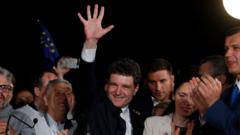The Romanian electorate faced a monumental decision in their recent presidential elections, resulting in the triumph of Nicusor Dan. Known affectionately as "Nicky," Dan's rise from the mayor of Bucharest to the presidency signifies a deeper yearning for change among voters who have long been discontent with the established political regime. His victory comes in stark contrast to that of George Simion, a hard-right nationalist with a controversial track record.
Nicusor Dan's Victory: A New Direction for Romania Amidst Political Division

Nicusor Dan's Victory: A New Direction for Romania Amidst Political Division
Romania's recent presidential election marks a pivotal shift as Nicusor Dan, a mathematician and current mayor of Bucharest, seeks to steer the nation away from extremism and towards unity.
Dan's ascent was seen by political analysts, like Radu Magdin, as a strategic rejection of fear and radicalism. Voters, energized by the need for stability and modern values, propelled Dan to victory, a response to Simion’s aggressive rhetoric, which included nationalistic undertones and public insults directed at opponents. The electoral atmosphere was notably charged, with many citizens motivated to prevent a backward political shift that could jeopardize Romania's relationship with the European Union.
Simion's campaign, despite its initial success in the first round, suffered from missteps that alienated moderate voters. As reports emerged of his dismissive comments about foreign leaders and a perceived retreat from public engagements, confidence in his leadership waned among undecided voters. A significant demographic shift occurred as young Romanians voiced their intent to emigrate should Simion win.
Celebrations erupted following Dan's victory, which many viewed as a defiance against Russian influence and a commitment to European integration. His supporters displayed EU flags, a testament to their desire for Romania to remain a progressive member of the European community.
While many hope for Dan to fulfill his promises of reform and unity, warnings about the considerable challenges ahead loom large. Analysts note that the political landscape remains split, and the emergence of nationalist sentiments continues to pose a potential threat. The next electoral cycle could very well serve as a litmus test for Romania's path in light of Dan’s and Simion’s conflicting visions.
As Nicusor Dan takes the helm, the path forward is fraught with expectations and tests of leadership that could redefine Romania's democratic future.
Simion's campaign, despite its initial success in the first round, suffered from missteps that alienated moderate voters. As reports emerged of his dismissive comments about foreign leaders and a perceived retreat from public engagements, confidence in his leadership waned among undecided voters. A significant demographic shift occurred as young Romanians voiced their intent to emigrate should Simion win.
Celebrations erupted following Dan's victory, which many viewed as a defiance against Russian influence and a commitment to European integration. His supporters displayed EU flags, a testament to their desire for Romania to remain a progressive member of the European community.
While many hope for Dan to fulfill his promises of reform and unity, warnings about the considerable challenges ahead loom large. Analysts note that the political landscape remains split, and the emergence of nationalist sentiments continues to pose a potential threat. The next electoral cycle could very well serve as a litmus test for Romania's path in light of Dan’s and Simion’s conflicting visions.
As Nicusor Dan takes the helm, the path forward is fraught with expectations and tests of leadership that could redefine Romania's democratic future.























